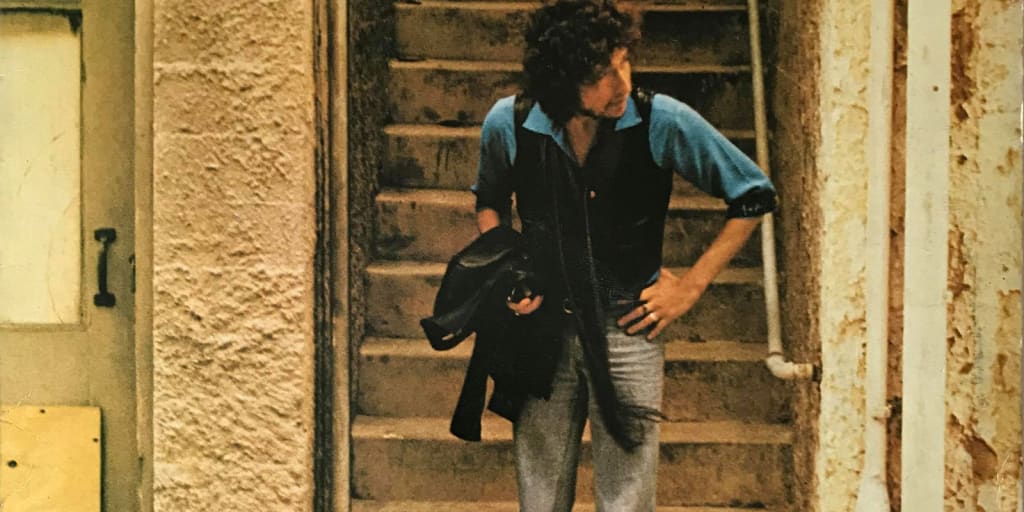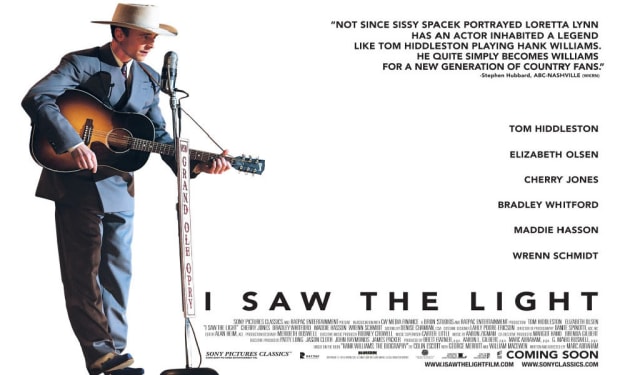Eden is Burning: The Prophetic Nightmare in Bob Dylan's "Street-Legal" (1978)
An Investigation into the Dark, Uncertain and Apocalyptic Undertones of This Album

Bob Dylan's "Street-Legal" (1978) is a massively underrated album and in some cases, it got very negative reviews. Rolling Stone Magazine for example, gave an unfavourable review to the album with the magazine's album guide giving it a two out of five rating. Overall, the reviews weren't favourable and neither were they very right. With only smaller magazines like "Melody Maker" giving it a good review, this was possibly one of the biggest outrages I have found in my Dylan exploration. I feel personally, as if this album hasn't been heard amongst the noise made by the following Gospel Era and the previous folk-hero-gets-a-divorce albums like "Desire" and the all-favourite "Blood on the Tracks". This album seems to fall in between two colossal moments for Dylan and so, gets lost amongst them and forgotten from time to time.
But, what if I told you that this could possibly be the link between the 70s Divorce Era and the Gospel Era?
The joining of the nightmarish sense of being "ravaged in the corn", "hunted by a crocodile" and someone "planting stories in the press" with being "saved by the blood of the lamb" by the "saving grace" that's apparently over him is the mixture that produces this album. Where one ends the other must begin but not right away. We were never just given the Gospel Era, we were never just thrown into it. The prophetic nightmare from the divorce era met the religious sentiment of the Gospel Era and came out with an experimental attempt at a folk/rock album that has a dark, brooding vibe crossed with the Biblical language we would get used to in the coming four to six years.
Let's now take a look at how that works. There are a number of prophetic nightmares in which the apocalypse is either mentioned, referenced or directly upon us in the midst of this album. It is neither covered up nor is it coloured with much flowery language and, in comparison to most of the other quotable paradoxes in the songs - they are some of the simpler images to decipher.
Changing of the Guards

Changing of the Guards is an epic narrative lasting around seven minutes and thus, giving Bob Dylan ample time to make his Biblical references and then colour them with darkness, death and destruction before the end of the song kicks in and ultimately, peace comes. Let's then have a look at what happens before this and how the nightmarish future meets the biblical present.
The first image we have is the good shepherd who is grieving. Since we have such a simplistic image, we can assume that this will enlarge later on to have almost a butterfly effect on the rest of the song when we finally hit the climactic point. When it states that there was a woman born on midsummer's eve, however, this seems to counteract that grieving image with an image of hope and celebration and so - these two will fight it out in the song to see which one is stronger. It is known that in the present, the nightmare wins and yet, in the future - peace comes.
We have the same two counteractions in the next verse as well, the captain goes down, possibly dying or being injured - and yet he is still in love with the maid. The act of love counteracting with death is so very important in the song because it will support the nightmare through death and dying and yet will also support the peace and tranquility through the act of eternal love. To confess love through death would be to defeat the notion of death and darkness by overcoming the darkness with the love for the maid with an ebony face.
We then find out that the maid is not of the Christian monotheist religion and so, the act of shaving her head may be for a number of reasons - one of which may be heresy. The mention of being torn between "Jupiter" and "Apollo" means that there is still a religious undertone to the song, but it is just a different religion. The messenger in this case would be Mercury and Mercury arriving with the black nightingale may be the symbol of darkness that we're looking for in this verse. What we have then is the maid taking the fall for love and so, creating a positive from the negative like the captain did by declaring his love in death. And then, we have the black nightingale ominously arriving with Mercury, the messenger of the gods.
The next verse contains again, the two opposing images. One is the biblical prophetic nightmare and the other is whatever is trying to counteract it; in this case it is peace and love. We have the setting which has "destruction in the ditches" and therefore, possibly is part of this apocalyptic nightmare we are going to witness as the song goes on and the climactic point becomes closer and closer. The fact that this verse is taking something which would be considered nightmarish and making it a part of the positive aspect of the song, something almost religious - means that there will be a possible defeat of the negative at the end of the song.
The whole song contains opposites, one negation which signals doom and misery and then, the positive that offers some light. Even though "Eden is Burning" - there is a suggestion that the characters' "hearts must have the courage of the changing of the guards..." Notice how "Eden is burning" - the negation is already happening, there is no doubt about it. Whereas, when talking about the positive enlightenment, there is a wavering or some kind of uncertainty which makes us wait for the end of the song. At the end of the song, we get the exact opposite to this, the positive is a statement and the negative is a suggestion. Through "Peace will come..." there seems to be a final statement and no doubt, whereas the negation is still a wavering 'might' or 'maybe'. There is no real statement made but it is yet an uncertainty because it hasn't yet happened:
"...But will bring us no reward when her false idols fall
And cruel death surrenders with its pale ghost retreating
Between the King and the Queen of Swords..."
There is a "when" in the suggestion which means that the limitation of time, as in the other verses concerning the positive - is a feature that will hinder the release of the negative, as were the positives in the previous verses.
The reason for this is to showcase the prophetic nightmare at its most extreme. If we have these negatives that go throughout the song, we must have a redemption stage. As in Revelation, the Biblical Text, there should be an enlightenment stage at the end of the negatives that limits how far the negatives are allowed to push the narrative. These negatives are a result of the apocalypse predicted by the song. Here are a list of the negatives that litter the narrative, starting from the verse "The Palace of Mirrors":
"The endless road and the wailing of chimes..."
"Near broken chains, mountain laurel and rolling rocks..."
"But Eden is burning, either getting ready for elimination..."
"But will bring us no reward when her false idols fall..."
These are the negatives, each with their own positive (as we have discussed using the examples of the verses before this). The positive does not outlaw the prophetic nightmare, but presents us with a turning point in which redemption and salvation may/may not be possible. This 'may' is the thing that not only keeps the audience listening to the song in order to find out the ending, but is also the thing that keeps us revisiting the song in order to look for the clues and hints to salvation that would point us towards what we really want - a happy ending with salvation.
These are the things that link the Divorce Era, the negative, to the Gospel Era, the enlightenment (positive). It is this meeting of the darkness and the light that continues throughout the songs of the album, especially the ones that are epic narratives. In "The Changing of the Guards" there is one particular verse that would hold suggestion that Bob Dylan actually is speaking about his relationship with Sara crumbling in the midst of the song. It suggests that she has, or will, lose faith in him and yet - he will still find inner peace. Which comes to beg the question of whether he was already planning the Gospel Era by this time.
"Peace will come
With tranquility and splendor on the wheels of fire
But will bring us no reward when her false idols fall
And cruel death surrenders with its pale ghost retreating
Between the King and the Queen of Swords"
As he had stated that he was no prophet, is Bob Dylan stating that he is Sara's false idol too? Are the "wheels of fire" the divorce proceedings? Is the inner peace Bob Dylan discovers the Gospel Era that rises out of the ashes of his divorce? And is the "pale ghost retreating" actually just a metaphor for Bob Dylan's most photographed and famous child, Jakob - who retreated between his mother and his father - throwing swords at each other? The cruel death being the undying truth that yes, no matter how many songs he writes about her, Sara Lowndes is leaving for the last time.
Señor

Possibly one of Bob Dylan's darkest and most enigmatic songs, "Señor" has the same darkness, prophecy and apocalypse that we hear in songs like "Masters of War" and "Blind Willie McTell" whilst having an entirely different sound. The song itself in its music, is dark and searching. It is soft and sounds somewhat uncomfortable. But why all this darkness? What is the apocalypse being suggested and why is it so obvious? Or is it obvious at all and we're just looking in the wrong place? Has Bob Dylan fooled us again?
The fact that Bob Dylan does not know where he's going and uses two completely different locations, one real and one fictional shows that he has yet to decide what to do with his life and so, this contradicts the message found at the end of "Changing of the Guards" in which he knows exactly what is happening. But, the religious undertones means that this may be more to do with Dylan's albums than his personal life and since he has used religion in many of his songs before, he has been down the same way in times gone by and so, the Gospel Era isn't really anything new. It's just more concentrated:
"Can you tell me where we're headin'?
Lincoln County Road or Armageddon?
Seems like I been down this way before
Is there any truth in that, señor?"
The fact that he's asking if there's any truth in it, may not be because he's asking if he's right but rather if there's any truth in what he believes about religion. To start the Gospel Era, he must end what is this prophetic nightmare and ask whether he is or is not heading down the road to Armageddon. He better hope not.
Finally, by the second verse, we may get a glimpse of Sara who has recently left the folk hero.
"Do you know where she is hidin'?"
Assuming this person he's talking to knows where Sara is, Bob Dylan is asking whether she's actually going to come back because this will impact whether he stays the folk hero or go on to write religious music. The comfortable becomes part of the nightmare since he has no idea whether this situation will change, or whether he will continue down the 'road'.
"How long must I keep my eyes glued to the door?
Will there be any comfort there, señor?"
The whole of the next verse seems to be Bob Dylan explaining Sara's current position and yes, again it's part of the apocalyptic and prophetic nightmare that may be to come according to this song. There is really nothing Dylan can do to stop it.
"There's a wicked wind still blowin' on that upper deck
There's an iron cross still hanging down from around her neck"
The 'wicked wind' may actually be the 'idiot wind' that we see in the album "Blood on the Tracks" and the "Iron Cross still hanging down from around her neck" is the stress that Sara has of her memory of Dylan, who is now becoming more religious. It makes her heart heavy with grief for her dissolved marriage.
Then we have this linking verse which brings us back to the prophetic nightmare without a sense of redemption like the kind we get in "Changing of the Guards". The mythical creature being able to be smelt suggests that this prophetic nightmarish apocalypse is getting ever closer and there seems to be no way out - it is far more pessimistic than the previous song we analysed.
"Señor, señor
I can see that painted wagon
Smell the tail of the dragon
Can't stand the suspense anymore
Can you tell me who to contact here, señor?"
The imminent apocalypse is then confirmed by the fact that the prophetic nightmare is actually not a dream at all, and whatever is coming is completely inescapable.
"He said, "Son, this ain't a dream no more, it's the real thing"
After a divorce, a person is normally heartbroken to say the least and so, Bob Dylan stating that he must lift himself up again using a different approach to music that will later become known as the Gospel Era seems like a solution to end to prophetic nightmare. The song is ambivalent as to whether it will solve anything though. Now that he is prepared, he seems to be "ready when you are" and says this in almost a way that suggests he is prepared for the impending doom about to happen. He is about to counter it, or at least try to.
"Señor, señor
You know their hearts is as hard as leather
Well, give me a minute, let me get it together
Just gotta pick myself up off the floor
I'm ready when you are, señor"
The song ends with this statement of change. The prophetic nightmarish apocalypse is fast approaching and aspects are already here, now the protagonist must prepare by reorganising his life in order to avoid the inevitable plummet into despair. The current place does not make sense and so he must 'overturn these tables' in order to rearrange the furniture in a way that may seem strange to the life he is currently living - this shows the difference of the Gospel Era upon his career. 'Disconnect(ing) these cables' is basically cutting the line. This is the final line between him and Sara and so, he is showing that in order to prevent the nightmare of despair - he must move on with his life and travel down the 'road' with the other character. Be that as it may, he is still unsure and ends the song with a question - we only find out the answer when he moves on to the next major era of his career.
Señor, señor
Let's overturn these tables
Disconnect these cables
This place don't make sense to me no more
Can you tell me what we're waiting for, señor?
The end of this song is so ambivalent that we actually have no idea whether the prophetic nightmare has ended or not. All we know is that now, the protagonist has a counter motive in order to prevent it.
No Time to Think

"No Time To Think" is yet another epic narrative of the album "Street-Legal" (1978) and this time is addressed to the listener/audience or the 'second person' of the song. Again, it explores the prophetic nightmare as the possibilities in existence and the way in which the second person lives their life. There are constantly life battles and wars on this prophetic nightmare are acted out. However, it is not certain as to what exactly the prophetic nightmare is, it could be the result of various existential crises that come through the song and the way in which the person lives may be the direct result of their fight against the nightmare. Have a look at the way in which the song starts in order to begin this spiral of the existential, relative to noticing or experiencing death:
"In death, you face life with a child and a wife
Who sleep-walks through your dreams into walls.
You're a soldier of mercy, you're cold and you curse,
"He who cannot be trusted must fall."
"In death you face life" seems to be the most oxymoronic and yet, most existential thing on this entire album. There is not a strong sense of the existential crisis, rather the noticeability of the existential. The character notices the way in which death impacts the viewpoint of life and whether the character is experiencing death or simply noticing their own mortality is unclear. It is possible that this could be some sort of nightmarish memento mori.
However, the process of death may also be the prophetic nightmare as it is related to the first verse in the sense that there is a reference to 'sinking' into death. Death is not a static thing, but an experience by the second person character:
"You fight for the throne and you travel alone
Unknown as you slowly sink..."
The oppressive nature of the empress is a key point in the experience of death as things of nature are more than often described as women. Death too, in this case, as an experience could be similar to love - and so, in this case, could be a woman as the songwriter is a straight man. This makes the nightmare more personal and oxymoronic as it is relative to love. Love and nightmares are hardly ever experience together, apart from in the songs of "Street-Legal":
"The empress attracts you but oppression distracts you
And it makes you feel violent and strange."
Then, we have the betrayal in the sense of the empress, being the symbol of love whilst being the personification of the experience of death as nightmarish existentialism - as a character who betrays the second person in the act of love, possibly revealing herself to simply be a sector of the prophetic nightmare:
"Betrayed by a kiss on a cool night of bliss..."
The 'cool night of bliss' being again, the experience of death as a symbol of love. But the 'betray(al)' is simply a guise for the real message: to trust those disguised as love is a folly. And this could be relative to Bob Dylan's own divorce in the fact that he once trusted a woman, but instead - he acknowledges he has done her wrong and so has to accept this experience of death which is actually his divorce.
The 'decoys' that are described in the song are partial bits of the prophetic nightmare. A decoy being a distraction, this would be to distract from the act of death (in Dylan's case a separation/divorce) and so, seeing the decoys and acknowledging them means that they possibly haven't worked and this is why the protagonist is now 'depressed'. The interchanging 'I' and 'You' are now clear to the fact that they may both be the same person.
"I've seen all these decoys through a set of deep turquoise eyes
And I feel so depressed."
As in the song "Changing of the Guards" there are now religious references not to Christianity, but to Roman Polytheism that could have something to do with the way in which death is experienced by the protagonist as not only an experience now, and not only an existential thought, but also through a message from fate and/or destiny. This message, according to the protagonist, is false.
"Mercury rules you and destiny fools you
Like the plague, with a dangerous wink..."
Describing the plague as having a 'dangerous wink' is not only personifying a disease but also giving light to the fact that the disease may actually just be a person after all. Mercury, the messenger of the Gods, seems to deliver the message from destiny that is about to fool the second person - the person fooling them is like a plague. The plague is not like the person, but the person is actually a plague. This would make far more sense as now they fit within the sphere of the prophetic nightmare as possibly having caused whatever happened at the beginning of the song to make the protagonist (both 1st and 2nd people) experience this death or existential crisis that is like death. The realisation of what has happened and the restoration of the normal come in the next verse, but does this actually restore anything or is the character still stuck in this existential bubble?
"Your conscience betrayed you when some tyrant waylaid you
Where the lion lies down with the lamb.
I'd have paid off the traitor and killed him much later
But that's just the way that I am."
Obviously, the answer is no - nothing has changed. There is still a traitor out there because they already know the moves of the protagonist:
"But the magician is quicker and his game
Is much thicker than blood and blacker than ink..."
Therefore, the prophetic nightmare is based upon what caused the death experience at the beginning of the song and having found the person/people etc. who caused it, the protagonist seeks them out but because of destiny and the Gods - nothing can really be done. This narrative may actually take place in the moments of death, the soul-searching and existential crisis going by in pictures and images reflecting different aspects of avoiding the prophetic nightmare. A personal apocalypse. This seems to me to be somewhere along the lines of the Odyssey by Homer, a man moved by fate who must return to himself but cannot due to the betrayal of death, messengers, gods and others who force him away from his own home within himself. He is doomed without fully knowing it.
The way in which various aspects of emotion seem to treat the protagonist too, is not so good. This is a direct product of fate and destiny seeming to fool the protagonist and after the 'killing' of the traitor - everything is now up in the air, destiny is angry and sends the most harsh of apocalyptic and prophetic nightmares down upon the protagonist. This again could be interpreted as the nightmare derived from Bob Dylan's own divorce proceedings as his own emotions get the better of him in the album "Blood on the Tracks" and some songs such as "Idiot Wind" are quite dark compared to lighter songs on the album.
"Anger and jealousy's all that he sells us,
He's content when you're under his thumb.
Madmen oppose him, but your kindness throws him
To survive it you play deaf and dumb."
The list of things that come just as the chorus kicks in are the list of qualities that the protagonist must have in order to survive this ordeal and so we get this line:
"Equality, liberty, humility, simplicity."
The second person then recognises that there is no way out of this ordeal and so, seemingly gives up against the prophetic nightmare of the death experience at the beginning of the song. The moments that follow are depressing and root themselves in the emotions that destiny forced upon the second person at the beginning of the previous verse. This shows he is losing his grip on his actual reality. Most likely, he is dying. Again, a metaphor for the lost love that Dylan himself is experiencing.
"You can't find no salvation, you have no expectations
Anytime, anyplace, anywhere."
The chorus of this verse seems to confirm those suspicions of not being able to hold on to love and having to experience death and existentialism as a result of this. The constant reference to drowning shows that this may be the way in which the character dies:
"You know you can't keep her and the water gets deeper..."
The next verse seems to go through the way in which the character changes beyond recognition now that he has accepted the prophetic nightmare into his system and fate. It is unclear as to whether he is happy or not, but what is clear is that finding himself as he was before is now an impossible task. To 'bur(y) (his) sanity' shows that the character no longer has much self-respect left for the prophetic nightmare to destroy. The 'lovers' of the song are obviously Sara Lowndes and possibly, Joan Baez - they no longer can recognise Bob Dylan as he undergoes this death experience in order to hopefully be let out the other side. A theme that will be revisited in the song "Saving Grace" from "Saved" (1980):
"You've murdered your vanity, buried your sanity
For pleasure you must now resist.
Lovers obey you but they cannot sway you
They're not even sure you exist."
Again, there is a list. But instead of being the qualities the character had, they are the qualities being forced upon the character now he has accepted his fate:
"Socialism, hypnotism, patriotism, materialism."
As the character travels to "Babylon" (the Biblical city of language), the character experiences a release from the grip of the death experience and thus, feels relieved but lonely. Realising he must leave everyone behind, he travels to the more Biblical state of mind and stays there - this is the introduction to the Gospel Era, something Dylan must have planned in order for this statement to be true:
"The bridge that you travel on goes to the Babylon girl
With the rose in her hair.
Starlight in the East and you're finally released
You're stranded but with nothing to share."
The next list of qualities are the qualities that the character now has within himself as a result of the split from the experience of death. Given new life, these are contradictory and it shows that the character has yet to figure himself out on this new trail:
"Loyalty, unity, epitome, rigidity."
These contradictory behaviours are the behaviours that end the song and so, the character has split from the prophetic nightmare only to have it seemingly hot on his heels. He can no longer experience the death that he once had and yet, he can still feel all the toxic emotions left behind by it. He is stuck within himself, but at least he can carry on:
"Bullets can harm you and death can disarm you
But no, you will not be deceived.
Stripped of all virtue as you crawl through the dirt,
You can give but you cannot receive."
The fact that now, the character has run out of time to make things right again shows that he must now carry on along the straight and narrow. There is a very clear notion that the character may not only experience these emotions for the rest of his life, but also that they may come to take over his life. The idea that there's no time to even say goodbye means that the character must leave everyone else behind and go wherever he is going all by himself. The victim being whatever difficulty he may encounter next. But at least the prophetic nightmare is gone:
"No time to choose when the truth must die,
No time to lose or say goodbye,
No time to prepare for the victim that's there,
No time to suffer or blink
And no time to think."
About the Creator
Annie Kapur
200K+ Reads on Vocal.
English Lecturer
🎓Literature & Writing (B.A)
🎓Film & Writing (M.A)
🎓Secondary English Education (PgDipEd) (QTS)
📍Birmingham, UK






Comments
There are no comments for this story
Be the first to respond and start the conversation.